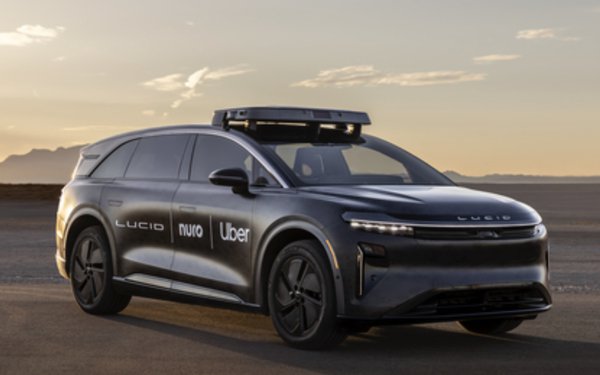
Uber is partnering with Lucid and Nuro on what the
companies are calling a “next-generation premium global robotaxi program.”
Expected to first launch later next year in a yet-to-be-named major U.S. city, the service
will combine the vehicle architecture of the Lucid Gravity, the scalability of the Nuro Driver Level 4 autonomy system, and Uber’s global network and fleet management.
“The agreement illustrates the renewed plans and push for financing for self-driving cabs years after a first wave of autonomous driving investment produced only a limited number of
vehicles,” according to Reuters. “Tesla has
recently launched a robotaxi trial in Austin and Alphabet’s driverless taxi unit Waymo is speeding up its expansion.”
advertisement
advertisement
Uber aims to deploy 20,000 or more Lucid
vehicles equipped with the Nuro Driver over six years. The vehicles will be owned and operated by Uber or its third-party fleet partners and made available to riders exclusively via the Uber
platform.
In an interview with CNBC, Lucid interim CEO Marc
Winterhoff called the partnership an opportunity for the EV maker to compete in a “completely new” addressable market it has yet to penetrate.
Lucid won’t have
issues delivering enough vehicles to meet demand from both Uber and its retail consumer base, Winterhoff told Bloomberg TV.
The first Lucid-Nuro robotaxi prototype
is already operating autonomously on a closed circuit at Nuro’s Las Vegas proving grounds.
As part of a deepening relationship with each partner, Uber plans to make
multi-hundred-million-dollar investments in both Nuro and Lucid.
“Shares of Lucid Motors dropped more than 8% by midday Monday, extending losses from Friday and
paring gains from a 36% rally on Thursday that followed the company’s announcement of a partnership with Uber and autonomous driving startup Nuro,” according to EV. “Lucid’s shares initially surged nearly 60% to $3.69
following the announcement....
"CNBC’s 'Mad Money' host Jim Cramer cast doubt on the significance of the deal during Monday’s broadcast, suggesting the investment lacked
the scale or strategic depth needed to materially shift Lucid’s outlook.”